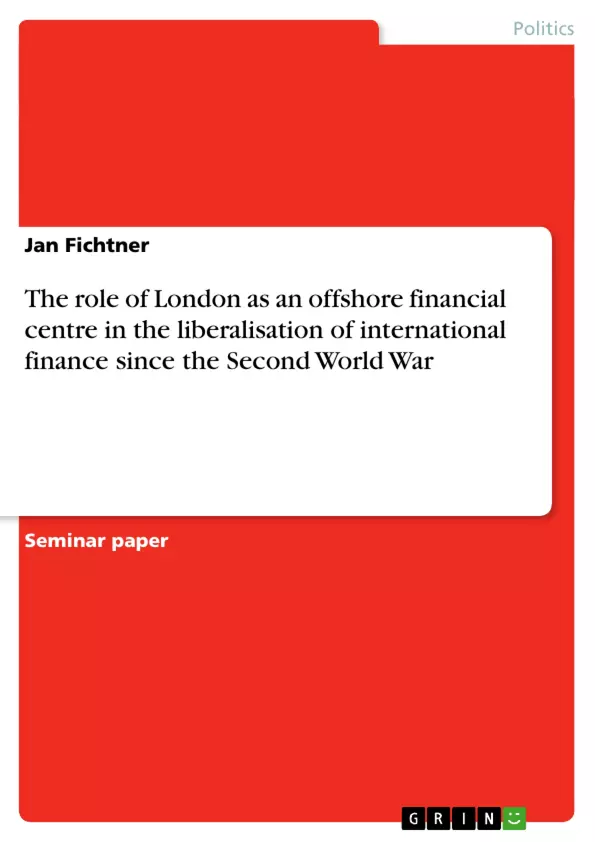This paper deals with the question whether the City of London acted as an offshore financial centre since the Second World War. This in turn is linked to the specific role London played in the liberalisation and deregulation of international finance which took place at an increasing pace since the 1970s. Special attention is paid to the rise of the so-called euromarkets and why this development was tolerated by the Bank of England.
Inhaltsverzeichnis (Table of Contents)
- After the Second World War
- The emergence of the so-called 'Eurodollar market'
- There are two popular theses about why the Euromarket emerged
- However, it has to be emphasised, that this ‘offshore’ status
- So why did the British state decide to tolerate this offshore market
- The main characteristic of the 'Lockean' state/society complex
Zielsetzung und Themenschwerpunkte (Objectives and Key Themes)
This essay examines the role of London as an offshore financial centre in the liberalisation of international finance following World War II. It explores the emergence of the Eurodollar market and the interplay between market operators and the British state in shaping this development.
- The historical context of international finance after World War II
- The emergence of the Eurodollar market in London
- The role of the British state in facilitating offshore finance
- The 'Lockean' state/society complex and its influence on British policy
- The dynamics between market operators and state actors in the development of the Euromarkets
Zusammenfassung der Kapitel (Chapter Summaries)
- This chapter outlines the post-World War II international financial system, emphasizing the Bretton Woods Agreement, fixed exchange rates, and the use of capital controls. This period marked a shift towards state control and regulation of international finance.
- This chapter details the emergence of the Eurodollar market in London in the late 1950s. It highlights the role of merchant banks seeking alternative sources of finance and the British state's abjuration of sovereignty in allowing non-sterling transactions to occur outside its regulations. This chapter introduces the concept of Euromarkets and their characteristics as markets operating outside national banking regulations.
- This chapter explores two popular theses regarding the origins of the Euromarket. The first attributes it to market innovation, while the second suggests it was primarily a result of state actions. The author argues for a more nuanced perspective, highlighting the collaboration between market operators and state officials, particularly from the Bank of England, in developing this offshore market.
- This chapter emphasizes the pivotal role of the British state in tolerating the offshore status of the City of London. Despite the possibility of extending its regulation over non-sterling transactions, the British government chose not to, allowing the Euromarkets to flourish outside its jurisdiction.
- This chapter introduces the concept of the 'Lockean' state/society complex, developed by Kees van der Pijl, to explain the British state's tolerance of the offshore financial market in London. This complex emphasizes the subordination of the state to civil society and the dominance of capital interests. It argues that the British state, guided by the 'Lockean' model, prioritizes stability and the enforcement of property rights over direct economic regulation.
Schlüsselwörter (Keywords)
Key terms and concepts include: offshore financial centres, liberalisation of international finance, Eurodollar market, Euromarkets, capital controls, fixed exchange rates, 'Lockean' state/society complex, British state, market operators, Bank of England.
Frequently Asked Questions
What role did the City of London play in international finance after WWII?
The City of London acted as an offshore financial centre, playing a pivotal role in the deregulation and liberalisation of international finance, especially through the development of the Euromarkets.
What are the Euromarkets?
Euromarkets are financial markets where transactions (such as loans or deposits) are conducted in currencies other than the local currency of the country where the bank is located, operating outside national banking regulations.
Why did the British state tolerate offshore markets in London?
The British state, particularly the Bank of England, chose to abjure sovereignty over non-sterling transactions to allow London to remain a global financial hub despite national capital controls.
What is the 'Lockean' state/society complex?
Developed by Kees van der Pijl, this concept describes a state model subordinated to civil society and capital interests, prioritizing the protection of property rights and market stability over direct economic regulation.
How did the Eurodollar market emerge?
It emerged in the late 1950s through a combination of market innovation by merchant banks and the deliberate policy of the British state to allow US dollar transactions to occur in London outside of standard regulations.
- Citar trabajo
- MA Internationale Beziehungen Jan Fichtner (Autor), 2004, The role of London as an offshore financial centre in the liberalisation of international finance since the Second World War, Múnich, GRIN Verlag, https://www.grin.com/document/33971



